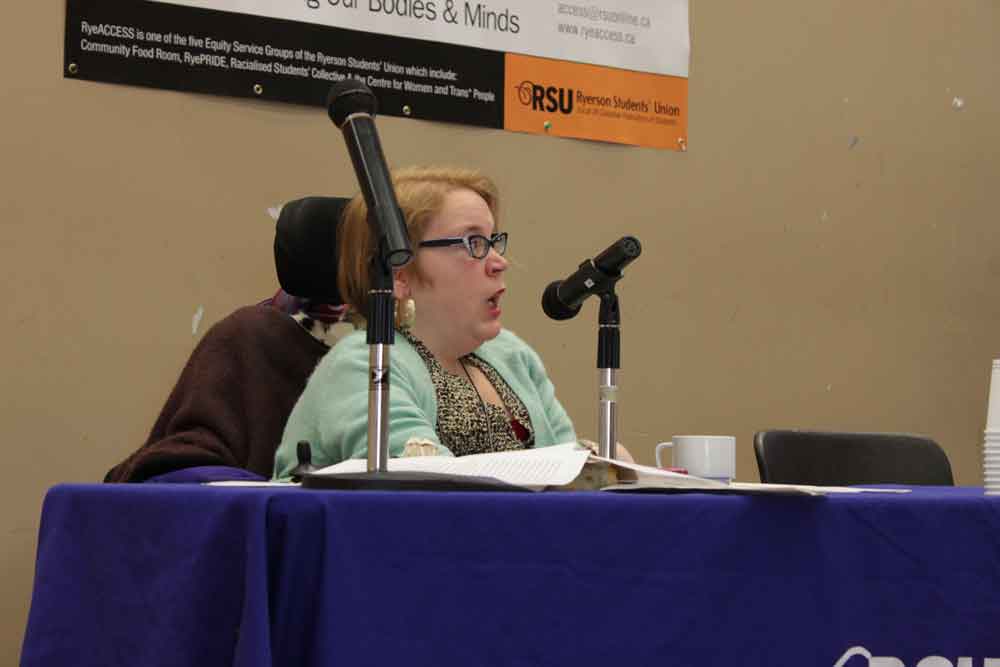By Aeman Ansari
The common negative associations people have with wheelchairs and other images of disability are just one side of the story. Dis/abled queer femme afropolitan and oppression practitioner Edward (Eddie) Ndopu said that this is why it’s imperative for disabled people to articulate their different experiences, so disabled people will no longer be seen as “incapable of contributing to society.”
“I think disabled bodies are often seen as lacking,” he said. “Disability is always framed as a [tragic] experience.”
Revisiting keynote speaker Loree Erickson, a self-described “poly queer femmegimp porn star”, said that one of the first “truths” she learned was that no one would ever want her as a partner because of her disability.
“According to the story of disability, disabled people certainly lead a life full of tragedy and/or pathology, to those around us as well as the state,” Erickson said. “Society and its images say we need to jump out of our problematic bodies into one normative privileged body, [that] disability is something that should be prevented or gotten rid of.”
She said people often think the only hope for her is a cure, but she thanks God that there is “no amount of bracing [that] can bring [her] unruly body into line.”
To counteract the many stigmas associated with both visible and invisible disabilities, Ryerson hosted its second three- day-long conference, Reclaiming Our Bodies and Minds: Disability, Oppression and Action!. The event allowed students and community members to interact with activists, survivors, artists and varied working professionals to discuss how society disables people rather than how disabled people affect society.
“Accessibility and accommodation is not the same thing. If we create accessibility in the first place, there would be no need for accommodation. [So] it’s not about integrating disabled people to non-disabled places, it’s about providing integrated services,” said Heather Willis, Ryerson’s first accessibility coordinator and co-chair of ACCESS Ryerson.
“The problem is not with the disabled person, the problem is the environment. Disability is diversity, not a deficit.”
Ryerson is the first school in Canada to offer a bachelor of arts or a minor in disabilities studies and it is currently at the heart of a lot of disability activism happening in the country. The three-day conference drew people from all over the country and included a series of panel discussions and workshops.
Event organizer Jenny Blaser, who is also a member of RyeAccess, said she thinks the event provided a chance to have conversations about disabilities that don’t happen in the traditional academic community.
“I think this event is important because we have a lot of community building and networking here that we don’t have in academia. A lot of disabled people are systematically excluded from academia. This is a great place to come together and have a conversation,” she said.
Organizers paid special attention to be inclusive to all those attending. Meals were made available to meet all dietary needs; a room with dim lighting and yoga mats was set aside for individuals who wanted to unwind. Live captioning and interpreters were also provided throughout the event.
The event also included performances such as “My Leaky Body”, a play full of dark humour and uncomfortable honesty, speakers with resonating stories, a screening of porn and an intimate game of “crip bingo” — in which people had to match those in the room to a variety of sexual practises listed.
While the event did help to break down boundaries and stigmas attached to disability, Willis said that in her utopia there would be no “access” groups and students would get what they need. She said that she hopes events like this are the key to one day living in that accessible utopia she dreams about.










Keiandra
It’s really sad to know that discrimination still exist even in the most minuscule forms. I would have never guessed that there is still such an issue with accessibility… I’m glad this piece was done. We need more voices for issues like this that aren’t glamorous but need just as much exposure to find solutions.
Anonymous lol
“a self-described Dis/abled queer femme afropolitan and oppression practitioner” lol.